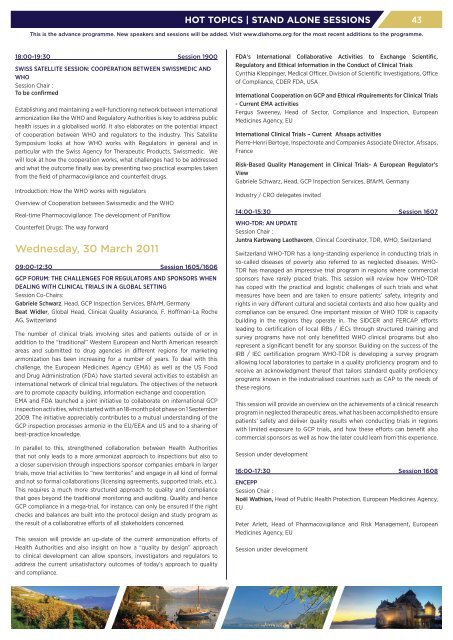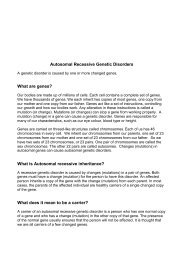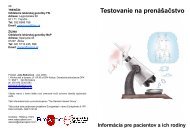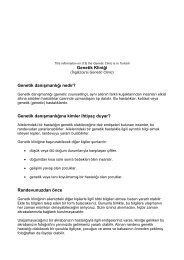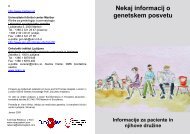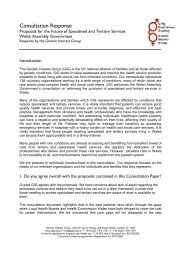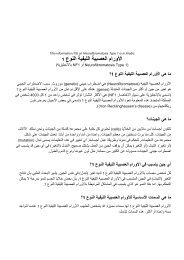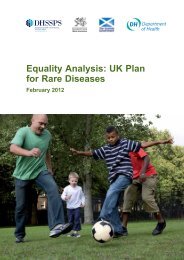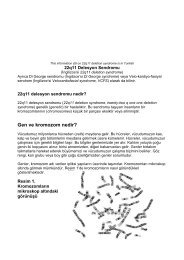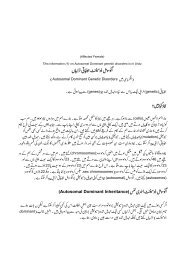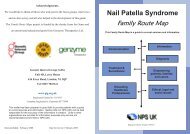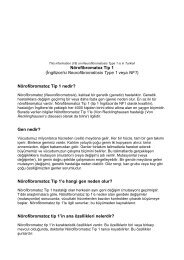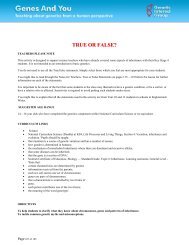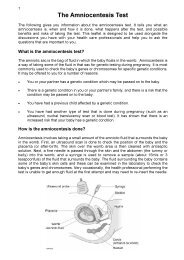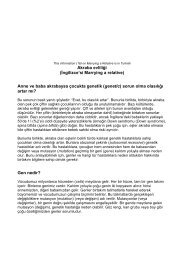EuroMEEting - Genetic Alliance UK
EuroMEEting - Genetic Alliance UK
EuroMEEting - Genetic Alliance UK
You also want an ePaper? Increase the reach of your titles
YUMPU automatically turns print PDFs into web optimized ePapers that Google loves.
HOT TOPICS | STAND ALONE SESSIONS<br />
43<br />
This is the advance programme. New speakers and sessions will be added. Visit www.diahome.org for the most recent additions to the programme.<br />
18:00-19:30 Session 1900<br />
SWISS SATELLITE SESSION: COOPERATION BETWEEN SWISSMEDIC AND<br />
WHO<br />
Session Chair :<br />
To be confirmed<br />
Establishing and maintaining a well-functioning network between international<br />
armonization like the WHO and Regulatory Authorities is key to address public<br />
health issues in a globalised world. It also elaborates on the potential impact<br />
of cooperation between WHO and regulators to the industry. This Satellite<br />
Symposium looks at how WHO works with Regulators in general and in<br />
particular with the Swiss Agency for Therapeutic Products, Swissmedic. We<br />
will look at how the cooperation works, what challenges had to be addressed<br />
and what the outcome finally was by presenting two practical examples taken<br />
from the field of pharmacovigilance and counterfeit drugs.<br />
Introduction: How the WHO works with regulators<br />
Overview of Cooperation between Swissmedic and the WHO<br />
Real-time Pharmacovigilance: The development of Paniflow<br />
Counterfeit Drugs: The way forward<br />
Wednesday, 30 March 2011<br />
09:00-12:30 Session 1605/1606<br />
GCP FORUM: THE CHALLENGES FOR REGULATORS AND SPONSORS WHEN<br />
DEALING WITH CLINICAL TRIALS IN A GLOBAL SETTING<br />
Session Co-Chairs:<br />
Gabriele Schwarz, Head, GCP Inspection Services, BfArM, Germany<br />
Beat Widler, Global Head, Clinical Quality Assurance, F. Hoffman-La Roche<br />
AG, Switzerland<br />
The number of clinical trials involving sites and patients outside of or in<br />
addition to the “traditional” Western European and North American research<br />
areas and submitted to drug agencies in different regions for marketing<br />
armonization has been increasing for a number of years. To deal with this<br />
challenge, the European Medicines Agency (EMA) as well as the US Food<br />
and Drug Administration (FDA) have started several activities to establish an<br />
international network of clinical trial regulators. The objectives of the network<br />
are to promote capacity building, information exchange and cooperation.<br />
EMA and FDA launched a joint initiative to collaborate on international GCP<br />
inspection activities, which started with an 18-month pilot phase on 1 September<br />
2009. The initiative appreciably contributes to a mutual understanding of the<br />
GCP inspection processes armoniz in the EU/EEA and US and to a sharing of<br />
best-practice knowledge.<br />
In parallel to this, strengthened collaboration between Health Authorities<br />
that not only leads to a more armonizat approach to inspections but also to<br />
a closer supervision through inspections sponsor companies embark in larger<br />
trials, move trial activities to “new territories” and engage in all kind of formal<br />
and not so formal collaborations (licensing agreements, supported trials, etc.).<br />
This requires a much more structured approach to quality and compliance<br />
that goes beyond the traditional monitoring and auditing. Quality and hence<br />
GCP compliance in a mega-trial, for instance, can only be ensured if the right<br />
checks and balances are built into the protocol design and study program as<br />
the result of a collaborative efforts of all stakeholders concerned.<br />
This session will provide an up-date of the current armonization efforts of<br />
Health Authorities and also insight on how a “quality by design” approach<br />
to clinical development can allow sponsors, investigators and regulators to<br />
address the current unsatisfactory outcomes of today’s approach to quality<br />
and compliance.<br />
FDA's International Collaborative Activities to Exchange Scientific,<br />
Regulatory and Ethical Information in the Conduct of Clinical Trials<br />
Cynthia Kleppinger, Medical Officer, Division of Scientific Investigations, Office<br />
of Compliance, CDER FDA, USA<br />
International Cooperation on GCP and Ethical rRquirements for Clinical Trials<br />
- Current EMA activities<br />
Fergus Sweeney, Head of Sector, Compliance and Inspection, European<br />
Medicines Agency, EU<br />
International Clinical Trials – Current Afssaps activities<br />
Pierre-Henri Bertoye, Inspectorate and Companies Associate Director, Afssaps,<br />
France<br />
Risk-Based Quality Management in Clinical Trials- A European Regulator’s<br />
View<br />
Gabriele Schwarz, Head, GCP Inspection Services, BfArM, Germany<br />
Industry / CRO delegates invited<br />
14:00-15:30 Session 1607<br />
WHO-TDR: AN UPDATE<br />
Session Chair :<br />
Juntra Karbwang Laothavorn, Clinical Coordinator, TDR, WHO, Switzerland<br />
Switzerland WHO-TDR has a long-standing experience in conducting trials in<br />
so-called diseases of poverty also referred to as neglected diseases. WHO-<br />
TDR has managed an impressive trial program in regions where commercial<br />
sponsors have rarely placed trials. This session will review how WHO-TDR<br />
has coped with the practical and logistic challenges of such trials and what<br />
measures have been and are taken to ensure patients’ safety, integrity and<br />
rights in very different cultural and societal contexts and also how quality and<br />
compliance can be ensured. One important mission of WHO TDR is capacity<br />
building in the regions they operate in. The SIDCER and FERCAP efforts<br />
leading to certification of local IRBs / IECs through structured training and<br />
survey programs have not only benefitted WHO clinical programs but also<br />
represent a significant benefit for any sponsor. Building on the success of the<br />
IRB / IEC certification program WHO-TDR is developing a survey program<br />
allowing local laboratories to partake in a quality proficiency program and to<br />
receive an acknowledgment thereof that tailors standard quality proficiency<br />
programs known in the industrialised countries such as CAP to the needs of<br />
these regions.<br />
This session will provide an overview on the achievements of a clinical research<br />
program in neglected therapeutic areas, what has been accomplished to ensure<br />
patients’ safety and deliver quality results when conducting trials in regions<br />
with limited exposure to GCP trials, and how these efforts can benefit also<br />
commercial sponsors as well as how the later could learn from this experience.<br />
Session under development<br />
16:00-17:30 Session 1608<br />
ENCEPP<br />
Session Chair :<br />
Noël Wathion, Head of Public Health Protection, European Medicines Agency,<br />
EU<br />
Peter Arlett, Head of Pharmacovigilance and Risk Management, European<br />
Medicines Agency, EU<br />
Session under development


